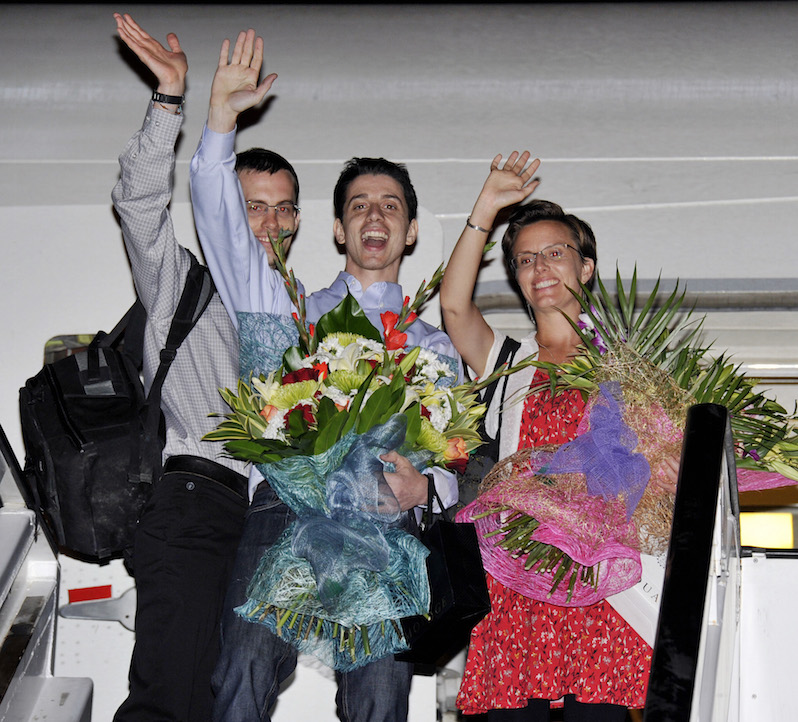An American Formerly Imprisoned in Iran Finds a Way to Break Out of ‘The Box’
After experiencing the horror of solitary confinement for over a year, Sarah Shourd now is using storytelling and the theater to heal herself and others. Sarah Shourd about to board a plane with Shane Bauer, left, and Josh Fattal in Muscat, Oman, in 2011. The three were on their way to the United States after the release of Bauer and Fattal from Tehran's Evin prison. Shourd had been freed in 2010. (Sultan al-Hasani / AP)
Sarah Shourd about to board a plane with Shane Bauer, left, and Josh Fattal in Muscat, Oman, in 2011. The three were on their way to the United States after the release of Bauer and Fattal from Tehran's Evin prison. Shourd had been freed in 2010. (Sultan al-Hasani / AP)
Sarah Shourd about to board a plane with Shane Bauer, left, and Josh Fattal in Muscat, Oman, in 2011. The three were on their way to the United States after the release of Bauer and Fattal from Tehran’s Evin prison. Shourd had been freed in 2010. (Sultan al-Hasani / AP)
When Sarah Shourd was a prisoner in Iran for 410 days, she thought she had devised a clever system to communicate in solitary confinement. Then she started talking with other prisoners and found out that all of them had figured out a way to have some kind of human connection.
That desire for relationship, Shourd thinks, is just as important as air, sunlight, water and stories. It’s one of the things that kept her going in prison after being arrested in Iran in 2009 with her friends Joshua Fattal and Shane Bauer (now her husband). The three had been living in Iraq, went for a hike one day, strayed over the border with Iran and were arrested. In 2010 when she got out of prison, Shourd had a hard time being around people, experienced symptoms of post-traumatic stress and just wanted to hide out. But her need to secure the release of Fattal and Bauer kept her from that, and Shourd has been working against solitary confinement since her release.
A journalist, she co-wrote a memoir, “A Sliver of Light: Three Americans Imprisoned in Iran,” and has edited an anthology, “Hell Is A Very Small Place.” But she also wanted to turn what had happened to her and others into a story so that others could start to empathize. So she created “The Box,” based on conversations with others in solitary confinement as well as her own time in prison.
Over a hot chocolate at a café around the corner from Z Space in San Francisco, where her play is being staged through the end of July, Shourd talked with Truthdig about storytelling, how solitary confinement attacks the frontal lobe, and wanting to include violent characters in her play.
Why did you choose to write a play?
I’m primarily a journalist, but it has been a necessity for me to attempt to tell this story in a way that taps into larger and more universal truths about what isolation does to human beings. It’s something I’ve been working toward since my own imprisonment. My colleagues at Solitary Watch suggested I write a play because they knew I did theater in my anti-war days. In my 20s, I did street theater. I was going into restaurants and malls and disrupted the public through agitprop. I did a lot of work with the Zapatistas, and we did our report-backs in theater.
This is a very different type of theater. It’s not agitprop at all—it’s just telling stories and helping people crawl inside these men suffering extreme punishment in our prisons right now. It’s based on real stories, and I spent over six months on in-depth letter correspondences, and I traveled to 13 prisons across the country to meet people.
But there are limits of being able to tell a story journalistically when you’re dealing with prisons. I couldn’t have a pen and paper. I’d be visiting people through glass, or they’d be in cages, and I had to rely on my memory. When I got back to my car, I’d scribble notes for hours. But I think even more so than the choice to fictionalize this as a play and a piece of theater was really so I could have the freedom to tap into my own experience as an artist and a survivor to be able to tell a more universal story about what it means to be human and how relationships define us.
Ironically, it’s about isolation, but it’s also about relationships and how any kind of human connection is how we self-organize and how we continue to struggle for survival and maintain our humanity under dehumanizing conditions.
I read that you developed a routine to deal with your isolation.
In the early months of my imprisonment, I had no idea how to deal with isolation. I was constantly fluctuating between terror and depression. I would lose control and scream and literally beat the walls of my cell, or I would not get off my cot for days or not eat. There was a moment of epiphany when my interrogators told me I wasn’t going to court, and they didn’t know if or when I would ever get out. They basically told me that if my government didn’t do something, I might never get out. I went back to my cell, and I was rocking back and forth in the corner, and I heard screaming. I thought, whoever is screaming, I need them to stop. I can’t listen to it anymore. The guards burst into my cell, and I realized it was me screaming. I saw myself in that moment, and I thought, other people have gotten through this. There must be a way, and I’m going to find it. From that point on, I had a completely disciplined regime, and it was about not letting any idle time — or despair would creep in, and terror and doubts just overwhelm me. That was what saved me.
Did you have things to read?
Eventually, they gave us reading materials, but it was a good six months into my imprisonment when I got a Koran and a few Dan Brown books I read over and over. I made up my own stories, and I told stories to invisible audiences. Storytelling and theater are a big part of how I survived. In the beginning, voices in my head kept saying, “You’re never going to get out of here, this will break you.” I had to conquer that narrative and upend it, and I decided that not only was I going to get out, but I was going to be stronger and make something meaningful out of something horrifyingly arbitrary and brutal and senseless.
When you first got out, did you want to withdraw?
I had to get my friends out, so I was really lucky I couldn’t just crawl back into another hole and lick my wounds, which is what you want to do. The entire time I was in isolation, I thought I would never want to be alone again, and I promised myself I would never have to be, but being around people is really difficult. You are constantly looking behind your back, you’re uncomfortable in public. When people touch you, you jump a few inches in the air. Even eye contact was physically difficult. But I had a mission. I was forced into the limelight, so I had to find a way to conquer the trauma and pour that suffering and pain into something larger. At first it was fighting for my friends, and then it was becoming an advocate against solitary. Was it hard to go into prisons to talk to other prisoners?
It’s pretty empowering to defy this draconian and opaque system and get inside and bring those stories out. I can’t begin to explain how incredible it is. For example, I traveled to New Jersey, got on a plane, got on a train, took the only taxi in this small town to the prison, and met this guy I’d been writing [to] for six months. I asked him to tell me any jokes the guys in the prison would tell each other. And he told me this hilarious joke, and I was able to carry that joke out of the prison, back through the snowstorm, on the train, and work it into the play and see actors perform it. Up to 5,000 people could be laughing at his joke. I think that is pretty amazing. These are people they want silenced. A lot of people in solitary confinement are put there to suppress their activism—they’re jailhouse lawyers, they’re people others look up to and respect, and they want to silence their voices. Having a voice at all is a miracle. That’s what art is all about.
You say a lot of the people in solitary are activists, but in your play you include violent people.
There are plenty of people who are put in solitary confinement for nonviolent offenses. You can get put there for having an extra bag of chips in your cell or walking too slowly down the hall or looking at a guard the wrong way—that could be considered insubordination. Forty percent of people who get put in solitary confinement have mental illness, and prisons don’t have the resources or the will to treat mental illness, so they just put them in conditions that exacerbate mental illness.
Prisons are violent places, and there are horrifying predators, and I have no desire to shy away from that or whitewash it in any way because I believe in order to actually end mass incarceration, we have to address violence. Even if we let out all the nonviolent offenders, we would still have mass incarceration. We have a very violent society. Some of the characters in my play, I wouldn’t necessarily want to be close friends with them, but it doesn’t benefit us in any way to be torturing them and putting them in circumstances that potentially make them more violent. Solitary confinement attacks the frontal lobe, the part of your brain that helps with impulse control. People who don’t have life skills or haven’t developed ways to deal with their anger nonviolently are put in conditions that make them more violent.
That’s one of the questions this play asks: How does this practice in any way benefit us, and what are we going to do — really — about violence in our society? Because right now solitary confinement is a control mechanism inside prisons. They don’t want to deal with the political, the unruly prisoners. So they warehouse them and lock them in boxes and then dump them on society. So it’s not so much the issue “Do they deserve this?” It’s, as a society, in what way does our prison system give us what we deserve?
What is hopeful for you?
I think, most importantly, the culture is shifting. The changes in legislation, both federal and state by state, to limit solitary confinement and change sentence laws is relatively minor when you look at the number of people it affects. The most hope I get is that culturally, people actually have a different story around who ends up in our prison system and why. The laws passed to limit solitary confinement, which is the worst punishment we dole out other than the death penalty, are relatively minor.
What’s most hopeful for me is once those stories change, prisoners no longer become a number. You throw numbers around like over 2 million people incarcerated. Those numbers are completely abstract. They don’t have a human face, they don’t have a family, they don’t have a childhood. That’s why I believe storytelling plays such a crucial role in the actual lasting cultural change. How do people communicate with each other in solitary?
No matter what restrictions you put on them, especially in a situation where you are terrified and you have no power, human beings find a way to reach out to others and make contact. It’s what we do. When I was in prison, in the beginning, it was knocking on the common wall or shouting to each other through the food vents.
But as I got more bold, I stole a pen from the interrogator, and I found paper in the trash, and I devised a method with another prisoner of passing clandestine notes. Those notes were my lifeline. They were like love notes. We’d tell each other someday we’ll be free, and we’ll meet in Europe and we’ll dance all night and tell each other stories. We gave each other hope we would get our lives back.
When I got out, I thought my method of exchanging notes was just ingenious, and I was so proud of it; but I heard again and again from prisoners how they passed notes and communicated. There’s a whole spectrum of what solitary confinement looks like in this country, but mostly they communicate with each other. That’s how it works in the play. They shout at each other. They also fly kites, which is when they attach a note to a line and slide it under the door. I’ve heard about prisoners sending notes through the sewer system wrapped in plastic. They figure out if you flush at the right time, the notes will go to a particular prisoner. That really speaks to me of something much larger about us as a species, that we absolutely need each other. It’s profound and essential to our existence, as much as sunlight, air, water and food. We need to be in relationship to other human beings.
You say you thought your communication method was ingenious. What was it?
I used a maxi pad. They gave us beef stew on Tuesday night, and I would soak it so it looks soiled, and I would make a note with the pen I stole from my interrogator and put it inside the maxi pad and put it in the trash in the shared bathroom. I could shout at her at night when the lazy guard was working, and five knocks on the wall means there’s a note. Eventually, we were caught, and when we were caught, she was moved.
Have you been in touch with her?
She didn’t make it out. She was executed. Her name was Zahra Bahraini. She was very special. She was Dutch-Iranian. I believe she was framed. They charged her with drugs, but she was picked up at pro-democracy protest.
What’s exciting about seeing the play on the stage?
Seeing something come to life and grow and travel. I feel like I’m the only person who will ever know the journey from the beginning to the end of this. Driving up to Pelican Bay 18 hours through redwoods and going through the insane process of getting permission to visit a prisoner and looking at each other through a thick pane of glass and looking into each other’s eyes. A lot of times I would be shocked at how much we’d laugh. The joy of that connection was so beautiful. So the journey from these remote prisoners back to my own experience in Iran and now seeing it come to life onstage with these brilliant actors and designers. There are so many ways to use theater to elevate a story. It’s about making the invisible visible.
Recently a friend asked me what superpower I would have, and I think storytelling is a kind of superpower, to show what is possible and use that as a way to open up a door to what could be. Every person who comes to see this show will do something different with it. It will affect them in different ways. To me that’s the most exciting—what people will take away from it.
What would you like them to take away?
I believe the most important thing this play could do is for people to walk in the shoes of someone who is literally experiencing the most extreme punishment, I believe, on the face of planet. It’s a slow, methodical kind of torture, and it’s a perversion, and it’s happening all around us. It shouldn’t exist. I think it’s one thing to read an article about that and see statistics. It’s another thing to feel it. It’s being done in our name, under the pretense of making us safer, and I hope that makes people really angry.
Your support matters…Independent journalism is under threat and overshadowed by heavily funded mainstream media.
You can help level the playing field. Become a member.
Your tax-deductible contribution keeps us digging beneath the headlines to give you thought-provoking, investigative reporting and analysis that unearths what's really happening- without compromise.
Give today to support our courageous, independent journalists.









You need to be a supporter to comment.
There are currently no responses to this article.
Be the first to respond.